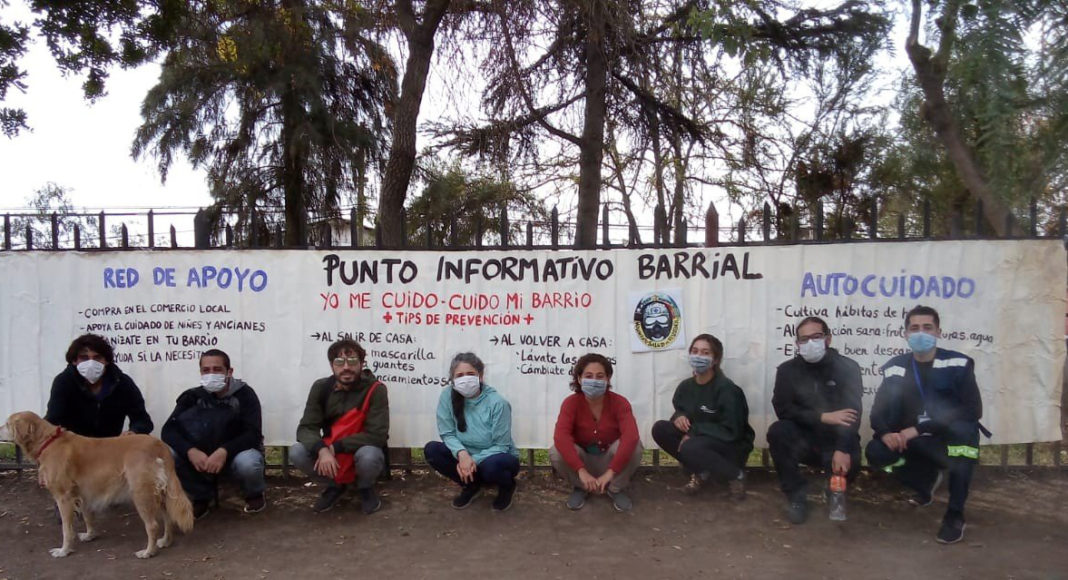This is the first of two articles with testimony from Chile’s protest movements and the impact of Covid-19.
See also our January article ‘Chile’s long hot summer of discontent‘
Sebastian Piñera’s government has taken the opportunity of Chile’s self-imposed isolation measures to paint over the political slogans that came to symbolise the fight against inequality in Chile. Now new watchwords are emerging. The protesters are re-channeling their energies into protecting those the government is leaving behind during the Covid-19 pandemic. The government’s failure to provide accessible healthcare, which was one of the driving motivations for the protests, is becoming more evident every day.
Covid-19 reached Chile on 3 March. It largely started in wealthy suburbs where international travel is more common. However, it was not until 18 March that Piñera declared a 90-day state of catastrophe to prevent the spread of Covid-19, pledging to facilitate medical attention yet neglecting to detail specific measures. No nation-wide quarantines have been implemented, although certain areas have imposed their own. Instead, a nation-wide curfew has been mandated from 10pm to 5am. More recently, Piñera has caused controversy by saying Chile will issue ‘immunity certificates’ to people who have recovered from Covid-19, allowing them to return to work, despite there being no definitive evidence that people who contract coronavirus cannot be infected again.
Protests suspended
The arrival of the pandemic disrupted six months of sustained protests demanding a more equal society with a new constitution, forcing people off the streets. The few small demonstrations that have occurred since have been met with swift shutdowns, with police citing the breaking of social distancing laws as the reason for arrests. Public gatherings of more than 50 people are banned.
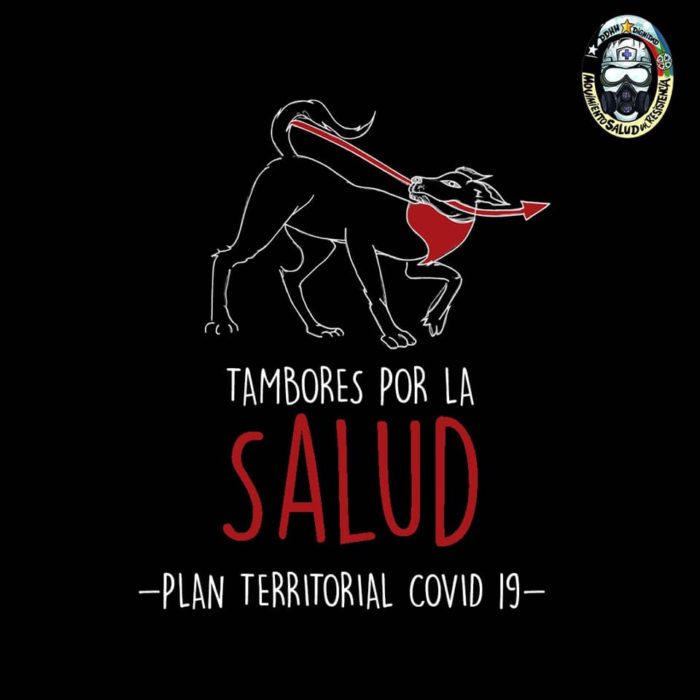
There is no doubt that timing of the virus outbreak is lucky for the government, which has been able to break up most physical protests and stress the need for the country to concentrate its energy on fighting the pandemic. Many Chileans worry that the government is taking advantage of the crisis to make citizens forget the anger driving the protests.
But the contradiction is clear to many Chileans. On the one hand, heavy-handed policing is said to be necessary to protect the health and safety of the public during Covid-19. On the other, the same police had acted with extreme violence to disperse protests organized precisely to force the government to improve public services, including health.
Yet President Sebastien Piñera should not take quieter streets as an indication that the movement itself has been quelled. In fact, the Covid-19 crisis has reinforced just how necessary the protests were and still are, in a country where in 2018 25,000 people died waiting for an operation due to the lack of funding for health care.
Chile during the pandemic is a lens through which to view with greater clarity than ever the social inequality fueling the protests. While rich neighbourhoods cut themselves off and self-isolate, most people are forced to squeeze onto crowded public transport to get to work. Public communication surrounding the virus is contradictory and unclear and mass profiteering by companies has driven up the cost of face masks by 1,666 per cent. Many Chileans have taken their own actions to halt the spread of the virus as best they can. But, without government-mandated lockdowns or widespread support packages for the most vulnerable, this is no easy task.
José Alfredo S. González
José, a nurse at the Universidad de los Andes in Santiago and a Public Health Masters student, is a member of Movimiento Salud en Resistencia (MSR), founded by health students who organised during the October 2019 revolt. MSR is trying to dispel misleading information and to teach communities how to stay safe, plugging the gaps left by the government’s inaction.
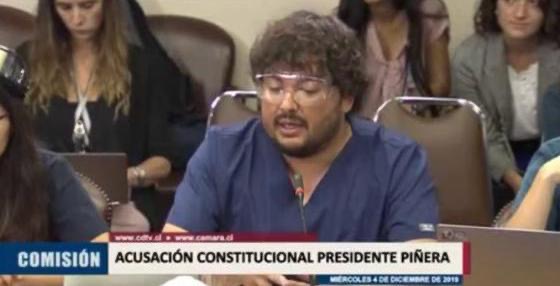
José explains why the movement’s genesis in the Santiago protests defines how they work today:
‘The Health in Resistance Movement (MSR) is defined as a political movement without partisan affiliation. We give first aid and do this as an act of protest. Today our job is to advocate for wide-ranging changes in the health system and, with it, political and economic transformation to give people the living conditions they deserve.
‘The MSR emerged from a decision by health students to go out into the street to coordinate and train, putting their knowledge at the service of the community. The human rights of protesters were systematically violated during demonstrations. We attended to protesters who were victims of state violence.’
José explains how the extreme repression faced by protesters required more than the coordination system MSR had developed to provide first aid care on the street. MSR started reaching out to different social organisations and communities to help create ‘safe spaces’ where they could treat injuries caused by the showers of rubber bullets, tear gas and water cannons that besieged protestors:
‘And so, in the midst of the revolt, we built the Health in Resistance Movement (MSR) on November 17, 2019.
‘The MSR is made up of various health professionals, legal professionals, and a group with deep roots in the protection of human rights. The MSR also assists people in their complaints [against authorities] with legal documentation of both the treatment and the injury records, so that the victims can obtain justice for the crimes the state committed against them.
‘Now MSR has many functions: conducting health training, sanitising public spaces, educating the community regarding the COVID pandemic, assuming the role abandoned by the state. Without this work of building a social fabric through the self-convened and self-managed health emergency committees this would not have been possible.’
Initially, Chile was lauded for having the highest testing rates in Latin America, but José explains that in reality things weren’t functioning well on the ground, prompting MSR to take action:
Work in the neighbourhoods
‘After the country momentarily stopped, we began to notice the absence of health teams on the ground educating the population, something that is key to preventing the spread of the virus by breaking the chain of epidemiological transmission.
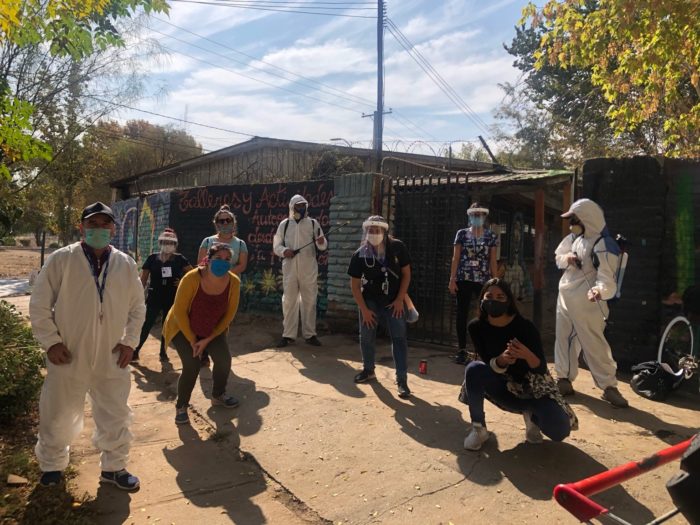
‘Led by MSR, health operations have been coordinating with neighbourhood emergency committees and assemblies. This allows us to communicate, simply but effectively, the different ways of preventing the transmission of the virus in highly vulnerable populations.
‘We’ve been able to resolve doubts directly, taking all recommended precautions: hand washing, use of a clinical mask, keeping a distance of at least 1.5m. We’ve also released educational videos on the responsible use of masks and clinical hand washing aimed at adults and children, as well as constant infographics about Covid-19, its transmission and ways to prevent it.
‘We also have a mental health commission, who publish documents to support those whose mental health has suffered due to physical isolation and the breakdown of normal daily life, with recommendations for activities, self-comfort exercises, and so on.’
MSR’s work is sorely needed given that the pandemic has served to further emphasise the highly unequal access to healthcare in the country, with the wealthy accessing well-equipped private hospitals while the majority make do with a desperately under-funded public health system.
José explains that this has impacted the mortality rate of the poorest sectors of the population as the public health system supports ‘about 15 million Chileans’ while the private ‘barely covers 4 million (20% of the population)’. With Covid-19 arriving during the flu season, the annual collapse of emergency and hospitalisation services has been exacerbated:
Wanted: a new model for the health service
‘This has led, during this period to the continual contracting out of external services, such as critical beds, examinations, and backup teams of professionals. It’s become clear that the whole model of health services must be changed. We need a new health system where solidarity, universal access and financial protection are integral to its operation and collective work is the keystone of its organisation.
‘People want to carry out physical isolation in their homes, but the political measures taken by the authorities have generated confusion, with quarantine surges in some communities while the confirmed cases of Covid-19 continue to increase dramatically.
‘But the question is: What do we do with those who live on the minimum wage and have jobs that don’t allow working from home? Are we exposing them to the possibility of contracting the virus? Once again, inequalities pre-determine what will happen to each person, and the policies the government implements allow it to act with total freedom against those who they, as a government, are called on to protect.
‘The state has taken full control of all hospital institutions in the country (public and private), but the pandemic is only beginning. If we take into account that the health system generally is weak, and that during the winter it collapses completely, it is difficult to imagine that those who fall ill with Covid-19 and need treatment will fare well.’
There are also worries that the state and the private corporations that dominate Chile, are taking advantage of the pandemic. José explains how companies are capitalizing on the crisis.
‘People hoped that after October 18 companies would change their practices and models, but we’ve found completely the opposite. Companies that supply personal protection equipment have drastically increased the prices of their products. The cost of a box of masks has escalated to almost £50 compared to £3 before the virus.
‘Large companies continue to profit at the expense of people’s lives and health. A similar situation occurs with diagnostic tests for coronaviruses, which are produced by Chilean companies and sold entirely to the state and privately, having an initial cost of around £10.
New ways to protest
While street protests are risky, the incredible solidarity and community spirit generated by the protests is being harnessed in new ways to help protect and fight for people’s rights. José explains how the protests which started in October last year have managed to continue albeit in different forms:
‘Indeed, the social movement is at a standstill, but dissatisfaction with the policies adopted by the government has been expressed in every neighbourhood, with people banging saucepans from their homes, blocking streets, and painting on the walls.
‘Although people are no longer gathering in the streets, they continue to meet online, and work in local emergency committees to support their neighbours to overcome the shortcomings of national and local governments. Home visits are made by health teams, and groups paint murals to inform the population, and to discredit the authorities.
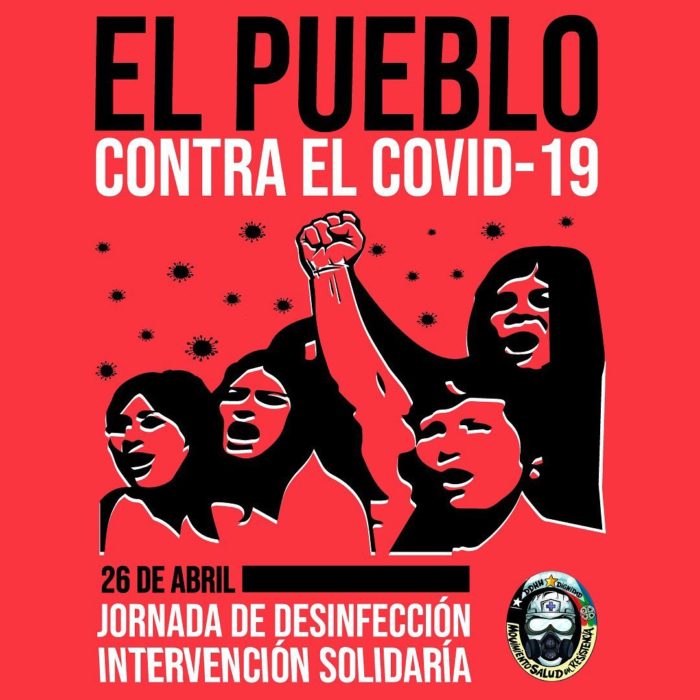
‘We believe that one of the largest acts of protest is local organisation and the solidarity between neighbours, which destabilises the proposal for social isolation imposed by the authorities, since we only physically isolated.
‘There have also been online protests. Every Friday people send out tweets known as Dignity Fridays, with slogans criticising the government’s poor policies for managing the Covid-19 pandemic. There have been calls for a total quarantine with the hashtags #CuarentenaConDignidadParaTodos #SoloElPuebloAyudaAlPueblo #LosMilicosNoSonLaCura.
‘The longing to meet again on the streets is great, the desire to win too. This time people are convinced that the arduous struggle that started with this social revolt will benefit the people of Chile and not the same powerful people that always seem to benefit.’
MSR is a prime example of the ongoing resilience and community solidarity borne out of the protests. Their dedication and swift changeover to protecting underserved people against the spread of Covid-19, is emblematic of their resistance to an inequitable government.
All images courtesy of MSR and José González

